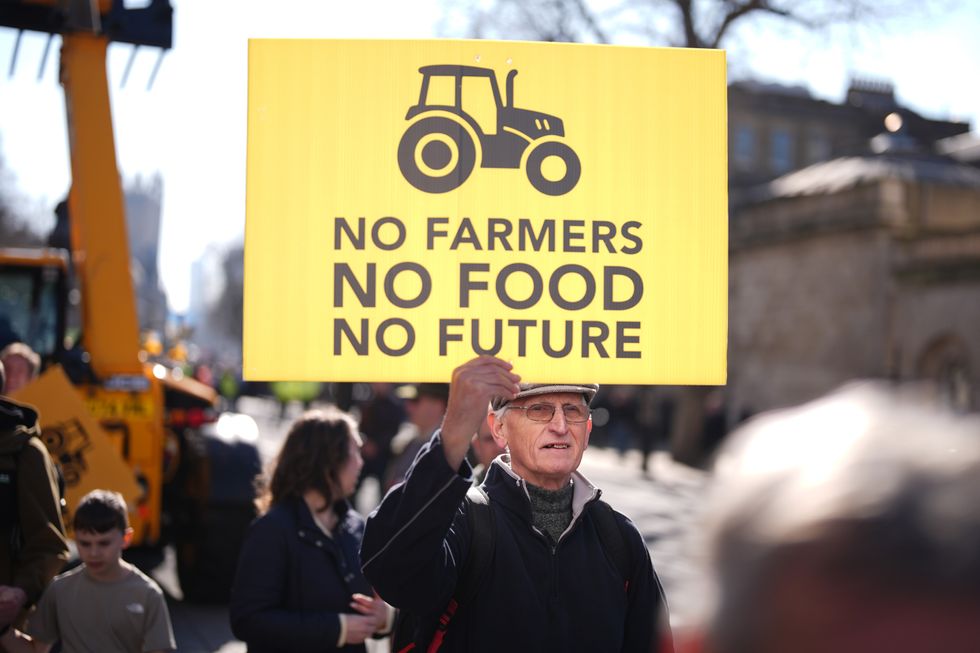Susanna Siddell
Guest Reporter
Farmers have planned to strike across Britain by refusing to release milling wheat from their stores, which could lead to a shortage of bread, cake and Hot Cross buns this Easter.
In protest against Rachel Reeves's Tractor tax, farmers have banded together to illustrate the "fragility of supply chains" and that dependency on imported wheat and flour is not reliable.
British farms were responsible for the production of more than 14 million tonnes of milling wheat in 2024 - while it is estimated that more than 85 per cent of wheat in bread production is homegrown.
As the grain is a core necessity to produce bread, the strike action could see supermarket shelves become void of baked goods.

Sharing the news online, one organiser wrote: "No hot cross buns for Easter! No barbecue baps! It might be April Fool's day but Britain's food security is no joke."
Other farmers have urged individuals to get in touch with their local MP in a bid to deter the Labour Chancellor from raising taxes on family farms, which is due to be set in motion from April 2026.
Cereal farmer Olly Harrison, who is participating in the strike, said: "Milling wheat is staying on farms. Farmers that grow milling wheat have gone on strike from April 1.
"They will not be loading any trucks with milling wheat and we will probably run out of flour.
LATEST DEVELOPMENTS:
"So if you're wondering why the shelves are empty, get onto your local MP and say you need to help these farmers out - you can't carry on putting them out of business.
"If there is rationing on bread and cakes and hot cross buns, it is the politicians' fault. It's not our fault. We can't carry on like this or we won't be in business."
In a blog post on The Farming Forum on March 31, farmers told milling wheat growers to "join others and do not load form April 1st for at least the first 2 weeks of the month" adding that "if you have a existing contract you have until the end of the month to deliver it".
It added that "if you are not a milling wheat grower, you may wish to invest in your farm's future with a trip to your local shops and buy a bit extra, get those shelves empty faster, we have seen panic buying on fuel and toilet rolls in the past."
In October, Reeves announced that combined agricultural and business property assets worth over £1million would be taxed at 20 per cent, sparking fury from farmers across the country.
Since last autumn, Whitehall has been visited by hordes of indignant farmers demonstrating against the controversial move.
The plans for the agricultural sector mean that family farms would still be slapped with the "death tax" even if a farmer dies fewer than seven years after their family received the estate.

A Government spokesman insisted that Whitehall's commitment to British farmers "remains steadfast".
He added: "This Government will invest £5billion into farming over the next two years, the largest budget for sustainable food production in our country’s history. We are going further with reforms to boost profits for farmers by backing British produce and reforming planning rules on farms to support food production.
"Our reform to Agricultural and Business Property Reliefs will mean farmers will pay a reduced inheritance tax rate of 20 per cent, rather than the standard 40 per cent for other businesses, and payments can be spread over 10 years, interest-free.
"This is a fair and balanced approach, which fixes the public services we all rely on, affecting around 500 estates a year," the spokesman claimed.
Find Out More...
In protest against Rachel Reeves's Tractor tax, farmers have banded together to illustrate the "fragility of supply chains" and that dependency on imported wheat and flour is not reliable.
British farms were responsible for the production of more than 14 million tonnes of milling wheat in 2024 - while it is estimated that more than 85 per cent of wheat in bread production is homegrown.
As the grain is a core necessity to produce bread, the strike action could see supermarket shelves become void of baked goods.

Sharing the news online, one organiser wrote: "No hot cross buns for Easter! No barbecue baps! It might be April Fool's day but Britain's food security is no joke."
Other farmers have urged individuals to get in touch with their local MP in a bid to deter the Labour Chancellor from raising taxes on family farms, which is due to be set in motion from April 2026.
Cereal farmer Olly Harrison, who is participating in the strike, said: "Milling wheat is staying on farms. Farmers that grow milling wheat have gone on strike from April 1.
"They will not be loading any trucks with milling wheat and we will probably run out of flour.
LATEST DEVELOPMENTS:
- Jeremy Clarkson blasts ‘awful’ Rachel Reeves as he’s forced to hike pub prices: ‘Losing money'
- Victory for farmers as tax hike for red diesel rejected despite fears Labour would target industry
- Spring Statement 2025: From ISA changes to inheritance tax - what to expect from Rachel Reeves
It might be April fools day but food shortages are no joke. Empty shelves will be appearing so better pop to your local supermarket and grab a loaf of bread and packet of hot cross buns for Easter before they run out.
But don’t panic buy ……… pic.twitter.com/EQvlM50h4D
— Andrew Ward(@wheat_daddy) April 1, 2025
Milling wheat strike in Uk ?
Will we see #rationing ?
Food security needs to be taken seriously will MPs listen ?
Apr and bpr has united farmers in uk more than ever to stick together & show just how important home grown food is ! pic.twitter.com/JVqGFp9R7W
— Olly harrisonAccidentalYoutuber (@agricontract) March 31, 2025
"So if you're wondering why the shelves are empty, get onto your local MP and say you need to help these farmers out - you can't carry on putting them out of business.
"If there is rationing on bread and cakes and hot cross buns, it is the politicians' fault. It's not our fault. We can't carry on like this or we won't be in business."
In a blog post on The Farming Forum on March 31, farmers told milling wheat growers to "join others and do not load form April 1st for at least the first 2 weeks of the month" adding that "if you have a existing contract you have until the end of the month to deliver it".
It added that "if you are not a milling wheat grower, you may wish to invest in your farm's future with a trip to your local shops and buy a bit extra, get those shelves empty faster, we have seen panic buying on fuel and toilet rolls in the past."
In October, Reeves announced that combined agricultural and business property assets worth over £1million would be taxed at 20 per cent, sparking fury from farmers across the country.
Since last autumn, Whitehall has been visited by hordes of indignant farmers demonstrating against the controversial move.
The plans for the agricultural sector mean that family farms would still be slapped with the "death tax" even if a farmer dies fewer than seven years after their family received the estate.

A Government spokesman insisted that Whitehall's commitment to British farmers "remains steadfast".
He added: "This Government will invest £5billion into farming over the next two years, the largest budget for sustainable food production in our country’s history. We are going further with reforms to boost profits for farmers by backing British produce and reforming planning rules on farms to support food production.
"Our reform to Agricultural and Business Property Reliefs will mean farmers will pay a reduced inheritance tax rate of 20 per cent, rather than the standard 40 per cent for other businesses, and payments can be spread over 10 years, interest-free.
"This is a fair and balanced approach, which fixes the public services we all rely on, affecting around 500 estates a year," the spokesman claimed.
Find Out More...
